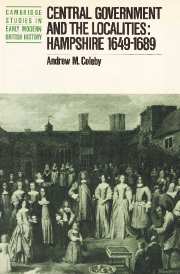Book contents
- Frontmatter
- Contents
- List of maps
- Acknowledgements
- List of abbreviations
- INTRODUCTION AND PROLOGUE
- PART I THE INTERREGNUM
- 1 LOCAL OFFICE-HOLDING 1649–60
- 2 THE ENFORCEMENT OF POLICY 1649–60
- 3 GOVERNMENT AND COUNTY 1649–60
- PART II THE RESTORATION
- PART III FROM THE POPISH PLOT TO THE REVOLUTION OF 1688
- EPILOGUE AND CONCLUSION
- Bibliography
- Index
2 - THE ENFORCEMENT OF POLICY 1649–60
Published online by Cambridge University Press: 14 October 2009
- Frontmatter
- Contents
- List of maps
- Acknowledgements
- List of abbreviations
- INTRODUCTION AND PROLOGUE
- PART I THE INTERREGNUM
- 1 LOCAL OFFICE-HOLDING 1649–60
- 2 THE ENFORCEMENT OF POLICY 1649–60
- 3 GOVERNMENT AND COUNTY 1649–60
- PART II THE RESTORATION
- PART III FROM THE POPISH PLOT TO THE REVOLUTION OF 1688
- EPILOGUE AND CONCLUSION
- Bibliography
- Index
Summary
DEFENCE AND INTERNAL SECURITY
In accounting for the Rump's failure to develop imaginative domestic policies, Professor Underdown has succinctly summarized its main casues:
Defence against the Commonwealth's enemies, internal and external, was necessarily their first priority; this meant dealing with Ireland, Scotland, the French, Royalists in and outside the country, and finally, overwhelmingly, the Dutch war. It meant the militia, the navy, and foreign policy.
Much of the government's involvement in the provinces was now concerned with defence and security. Even when the Council of State turned its attention to poverty, it is not hard to detect a concern for internal security motivating the initiatives it took. In July 1651, the Council of State wrote to the mayor and aldermen of Portsmouth, ordering them to relieve and find employment for the growing number of poor in the town. But this was not part of a coherent social policy. The Council made no attempt to conceal the fact that its concern arose solely from the potential threat which growing poverty posed to the security of the garrison.
Though its enemies changed slightly, the government's main concerns did not greatly alter under the Protectorate. Even spectacular initiatives, like the major-generals' experiment, were primarily concerned with internal security. The major-generals' militia was part of a retrenchment scheme designed to sustain the reduction of the tax burden on at least those members of the landowning classes who had not fought against Parliament.
- Type
- Chapter
- Information
- Central Government and the LocalitiesHampshire 1649-1689, pp. 32 - 63Publisher: Cambridge University PressPrint publication year: 1987

